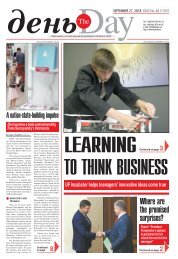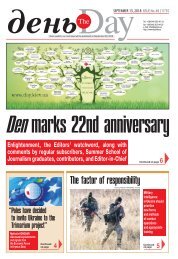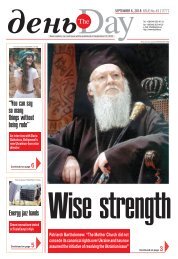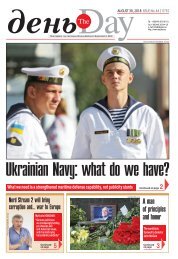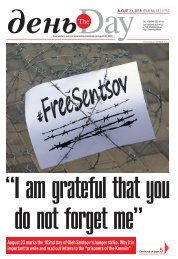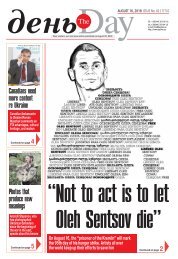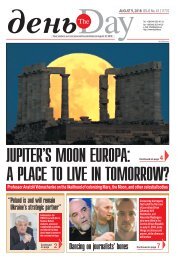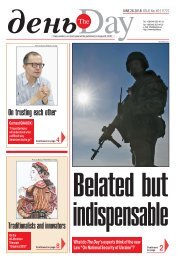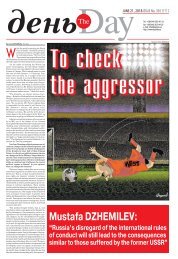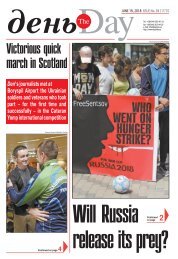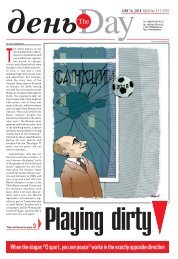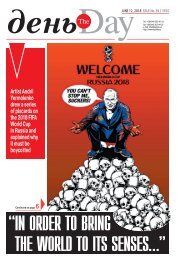#47_1-8
Create successful ePaper yourself
Turn your PDF publications into a flip-book with our unique Google optimized e-Paper software.
2<br />
No.47 SEPTEMBER 20, 2018<br />
DAY AFTER DAY<br />
WWW.DAY.KIEV.UA<br />
What the Book Forum-2018 will<br />
be like, and what are the plans<br />
of the Ukrainian Book Institute<br />
By Maria CHADIUK, The Day<br />
Lviv became a magnet for all book<br />
lovers, as the international Book<br />
Forum started here on September 18.<br />
Traditionally, this is not only an<br />
event where the most interesting<br />
books are launched (including this<br />
newspaper’s Ave...), but also a platform for<br />
the exchange of ideas and discussions of<br />
important social issues. Den/The Day met<br />
with president of the Publishers’ Forum<br />
Oleksandra Koval to find out what<br />
meanings were to be actualized at this<br />
year’s Forum. Also, we wanted to determine<br />
the priority issues in the literary sphere and<br />
learn which of them Koval planned to<br />
resolve as director of the Ukrainian Book<br />
Institute, the latter being an institution<br />
which many are hopeful about, but<br />
sometimes not fully aware of all the<br />
difficulties facing its head. Therefore, the<br />
following interview is also an attempt to<br />
analyze the situation and find ways to<br />
effectively solve the emerging problems.<br />
● FREEDOM AS<br />
(IR)RESPONSIBILITY<br />
The focus theme of this year’s Forum<br />
is the Freedom Market. The choice of the<br />
theme is due, among other things, to the anniversary<br />
of the 1968 revolution wave.<br />
What meanings you would like to actualize<br />
and what you would like to highlight<br />
with the Forum’s events?<br />
“We proceeded from the 1968 revolution<br />
wave to remind us of freedom in general.<br />
But when we began to ponder this topic,<br />
it became clear that with the recent<br />
spread of social networks, fake news, posttruth<br />
and all these negative phenomena<br />
(which are associated with the allegedly positive<br />
technology developments) the very attitude<br />
to many very basic values had<br />
changed. And even such a value as freedom<br />
has become negotiable. It probably has always<br />
been one, but now it is especially noticeable<br />
and clear. We would like intellectuals<br />
to express their views on this and our<br />
society to reflect on the fragile time we live<br />
in: it may turn out that anything can actually<br />
be bought and sold, while it seems to us<br />
that some things remain fundamental, and<br />
no one dares to touch them. So it seems to<br />
me that these should be some very interesting<br />
discussions.”<br />
Is this connected with the fact that after<br />
the Revolution of Dignity, there has<br />
been a deeper understanding emerging<br />
that we, as citizens, have to assume more<br />
responsibility, and we are capable of it, and<br />
so, we are actually freer and enjoy more<br />
freedom?<br />
“It is good to see such an interpretation,<br />
because most people usually think that freedom<br />
is complete anarchy. ‘My freedom’<br />
seems to mean ‘I do what I want, for example,<br />
I want to park on the sidewalk, although<br />
it inconveniences everyone else.’<br />
However, freedom is responsibility.<br />
“Incidentally, the Forum will host an<br />
interesting book launch of the 1st December<br />
Initiative Group, the intellectuals brought<br />
together by His Beatitude Lubomyr Husar.<br />
They are publishing a book which is called<br />
just that – Freedom and Responsibility.<br />
Overall, there will be many books dedicated<br />
to freedom there. By the way, the Forum<br />
will also launch a book by our splendid<br />
Photo by Artem SLIPACHUK, The Day<br />
Oleksandra Koval speaks about “climate creation”<br />
philosopher Myroslav Popovych, entitled A<br />
Philosophy of Freedom. I have even noticed<br />
(and I think that it is not only me): once you<br />
start to think about something extremely<br />
necessary to you, it immediately appears before<br />
you and leads you further and further.<br />
I am very excited about this.”<br />
● “THE PEOPLE OF CULTURE<br />
SHOULD SUPPORT EACH<br />
OTHER”<br />
The Night of Poetry and Music is one<br />
of the most successful events of the festival.<br />
Could you tell us how this idea came about?<br />
What is the secret to its success?<br />
“I do not know the secrets of how<br />
something becomes popular. Obviously,<br />
people always love poetry, and if it is combined<br />
with music, then they enjoy it even<br />
more. I came up with this format a long time<br />
ago, back in 1997. This night then lasted two<br />
hours, from 9 to 11 p.m. It has been held under<br />
its current title since 1999. All in all, we<br />
will host the 20th Night of Poetry and Music<br />
this year.”<br />
And to what extent, in your opinion, is<br />
such a combination of several art forms a<br />
promising idea?<br />
“From the very beginning, when the<br />
Forum was just being created (not as a onetime<br />
event, but as an event to be repeated),<br />
we aimed to get different art forms combined.<br />
We wanted the musicians to communicate<br />
with poets, artists with architects<br />
and so on, to create new valuable things. We<br />
did not really succeed then. I know that now<br />
the interaction between artists from different<br />
fields has improved. There is visual<br />
poetry, there is music of architecture, and<br />
so on. And all this is experimental in character<br />
and very interesting. I believe that it<br />
will become more common at some point, because<br />
the people of culture should support<br />
each other. In addition, the Ukrainians<br />
like something new: for instance, not just<br />
books, but books and fashion. The Forum,<br />
in turn, is totally open to all. When it<br />
comes to artists, we have created the<br />
Ukrainian Visual Book cluster, which is<br />
very successfully run by Pavlo Hudimov.<br />
We tried to create a music cluster as well,<br />
but failed at it, however, I have not lost<br />
hope. We have creative industries and urbanism<br />
represented, that is, we are already<br />
involving architects in it.”<br />
● A YEAR AND A HALF OF<br />
COMFORTABLE SITUATION<br />
FOR PUBLISHERS<br />
This, moreover, is a way to look at a<br />
certain art form from a new perspective.<br />
But you have repeatedly mentioned in interviews<br />
that the impetus for creating the<br />
Forum was a crisis that prompted a search<br />
for new forms of cooperation. How, in<br />
your opinion, has the situation in the literary<br />
sphere changed after the Revolution<br />
of Dignity and the beginning of the war in<br />
the east of Ukraine?<br />
“There are two possible responses to<br />
each crisis situation – you either freeze or<br />
start to run quickly. And in our case, the<br />
second option was chosen, so we have had<br />
a major recovery. Obviously, this is due to<br />
the Revolution of Dignity and the Maidan,<br />
but one has also to take into account<br />
the ban on the import of Russian literature<br />
to Ukraine. This gave our publishers a year<br />
and a half of a very comfortable situation,<br />
since bookstores now had room for our<br />
products. Meanwhile, consumers, prompted<br />
by a wave of enthusiasm and patriotism,<br />
began to read Ukrainian, even those who<br />
did not do it before.<br />
Continued on page 8 ➤<br />
By Mykola SIRUK, The Day<br />
Inna Steinbuka, European Studies<br />
masters’ program director at the<br />
University of Latvia, recently visited<br />
Ukraine. Ms. Steinbuka has the huge<br />
experience of holding top EU offices<br />
and directly participated in preparations<br />
for Latvia’s entry into Euro-Atlantic<br />
institutions. We began our conversation<br />
with the history of relations with Ukraine<br />
and the way she, a mathematical economist,<br />
became a European Commission official.<br />
“The history of relations with Ukraine<br />
carries me back to the Soviet era. I started<br />
my career in research and worked at the<br />
Academy of Sciences’ Institute of Economics.<br />
I maintained very good contacts in<br />
various republics, including Ukraine, for<br />
example, with Professor Valerii Heiets.<br />
Like Prof. Heiets, I focused on economic<br />
modeling and forecasting. As a mathematical<br />
economist, I dealt with mathematical<br />
models. I visited Kyiv many times.<br />
Those were, as a rule, business trips and<br />
conferences, but very warm memories<br />
about people, hospitality, and, naturally,<br />
an amazingly beautiful city have remained<br />
etched on my mind since then.<br />
“After a long pause, I came to Kyiv<br />
in a new capacity, when I worked at the<br />
European Commission as a department<br />
director at Eurostat. This was in 2006-07.<br />
My impressions were different, we discussed<br />
the problems of Ukraine-EU rapprochement,<br />
but people had not changed<br />
and remained as hospitable as before.”<br />
● “I APPLIED, QUITE<br />
SUCCESSFULLY, FOR FOUR<br />
OFFICES AND BEGAN TO<br />
WORK AT THE EUROPEAN<br />
COMMISSION”<br />
Ms. Steinbuka, how come you became<br />
later a European Commission official?<br />
“At the very beginning of Latvia’s independence,<br />
I transferred from the Academy<br />
of Sciences to the Ministry of Finance,<br />
and then represented Latvia in the<br />
IMF. That was my first experience of<br />
working at an international organization.<br />
In May 2014 I took part in a competition,<br />
announced in 10 countries, for the office<br />
of a top-level executive. I applied, quite successfully,<br />
for four offices and finally began<br />
to work at the European Commission. On<br />
the other hand, I did not represent Latvia<br />
in the EC – I just won the competition as<br />
citizen with a certain qualification. The<br />
competition for one of the four positions<br />
was at least 70 and 250 at most.<br />
“I began to work at the EC in November<br />
2005. I was a department director at Luxemburg-based<br />
Eurostat for six years. Then<br />
I moved to Latvia and held a quasi-diplomatic<br />
office. I headed the European Union’s<br />
representation in Latvia. It was mandatory<br />
for us, representation members, to know<br />
the Latvian language and, of course, to be<br />
citizens of an EU member state.<br />
“I have excellent command of the Latvian<br />
language, but I did not use it professionally<br />
in the Soviet era. I dealt with<br />
econometrics at the time. It was a narrow<br />
specialization, and this kind of specialists<br />
could be counted on the fingers of one hand.<br />
So there was no use publishing articles in<br />
Latvian. And I defended my PhD and<br />
higher doctorate dissertations in Saint<br />
Petersburg and Moscow, respectively.<br />
This is why all of my publications were in<br />
the Russian language.<br />
“My mother was born in Latvia, finished<br />
a Latvian high school, and knew the<br />
Latvian language perfectly. I went to a<br />
Russian school, and, although I studied the<br />
Latvian language as part of the school curriculum<br />
and sometimes spoke it to mother,<br />
my knowledge of it left much to be desired<br />
in the early 1990s. But I have made<br />
progress and no longer used Russian since<br />
the 1990s in my work.”<br />
● “I CONTRIBUTED<br />
TO LATVIA’S ADMISSION<br />
TO THE EU”<br />
I read in your resume that you were<br />
awarded an Order of Three Stars,<br />
Latvia’s highest award, for economic<br />
and financial achievements. Could you<br />
explain more in detail what for? Is it perhaps<br />
about your contribution to Latvia’s<br />
admission to the EU?<br />
“I formed a fiscal policy department at<br />
the Ministry of Finance, managed Latvia’s<br />
“MydreamwastotraveltoParis”<br />
Inna Steinbuka: the story of a Soviet-era Latvian mathematical<br />
economist who became a top European Commission official<br />
first Regulator of Community Services,<br />
and contributed to Latvia’s admission to<br />
the EU. I’d like to emphasize that I am a Euro-optimist.<br />
“I have always wanted Latvia and me<br />
to be part of Europe. It was my dream. I<br />
must have been ‘blacklisted’ and was<br />
banned from traveling abroad in the Soviet<br />
era. My dream was to travel to Paris.<br />
And this dream was perhaps not only<br />
mine. This city was associated in me with<br />
the heroes of Hemingway and Remarque,<br />
and it seemed to me that traveling to Paris<br />
was the same as traveling to the Moon.<br />
“When we gained independence, I, of<br />
course, took part, within my competence,<br />
in the EU accession negotiations at the earliest<br />
stage. Latvia signed the EU Association<br />
Treaty in 1995 and joined the EU in<br />
2004.<br />
“I’d like to draw a parallel with<br />
Ukraine: frankly speaking, if I had been<br />
asked in 1993 or 1994 whether I believed<br />
that Latvia would join the EU, I would have<br />
said that it would not happen in my lifetime<br />
but my children and grandchildren would<br />
live in the EU for sure.<br />
“But then things began to develop at<br />
a rapid pace. Therefore, it is always important<br />
to be at the right place in the<br />
right time. Both the international situation<br />
and successful domestic reforms promoted<br />
Latvia’s accession to the EU. So I’d like<br />
to wish Ukraine to cope with the homework<br />
and wait for a favorable situation, when<br />
these two factors coincide.”<br />
● “COMBATING CORRUPTION<br />
WAS ONE OF<br />
THE IMPORTANT<br />
PRECONDITIONS FOR<br />
THE ACCESSION TO NATO”<br />
And another award from the Ministry<br />
of Defense…<br />
“My participation in the Latvia-NATO<br />
talks was confined to a purely economic expert<br />
examination. For, if a country is going<br />
to join NATO, it is important not only<br />
to observe certain legislative, legal,<br />
military, and strategic conditions and criteria.<br />
There should be certain objective<br />
guarantees that the country will go on developing<br />
steadily. For steady economic<br />
development is also, to some extent, a<br />
guarantee of political stability.<br />
“Besides, if a country develops steadily<br />
and GDP grows, we can expect the<br />
budget to be formed in a stable way, which<br />
will allow allocating funds for maintaining<br />
the army and for other military purposes.<br />
In addition, one of the preconditions for the<br />
entry was combating corruption, including<br />
money laundering. Stable economic development<br />
in turn contributes to the overall<br />
reduction of corruption risks.”<br />
Incidentally, did the Latvian government<br />
or society show any hesitation about<br />
joining the EU and NATO?<br />
“Indeed, there were hesitations, especially<br />
on the very eve of the entry. Latvia<br />
held a referendum, and pro-Russian forces<br />
spread vicious anti-European propaganda.<br />
“People faced ideological pressure,<br />
when the very idea of entry was called into<br />
question and people were intimidated<br />
with terrible consequences. I must say<br />
our government was giving a lot of explanations<br />
at the time. Public opinion leaders<br />
and politicians came out in support of EU<br />
membership. This positive opinion overpowered<br />
propaganda, and the people<br />
strongly supported the entry at the referendum.”<br />
● “HUMANKIND HAS NOT YET<br />
DESIGNED A BETTER<br />
MODEL THAN THE EU”<br />
Ms. Steinbuka, I noticed on your Twitter<br />
page that you took part in the debate<br />
“Are European Values Universal?” on<br />
September 4. I wonder why such debates<br />
emerge in Europe.<br />
“It’s no secret that Europe has been<br />
subjected to biting criticism lately. Criticism<br />
can be positive. We ourselves can criticize<br />
Europe for not doing something the<br />
way we want. And we are doing so in an attempt<br />
to help improve Europe. On the<br />
other hand, there is such thing as propagandistic<br />
criticism, disinformation, and<br />
fake news.<br />
“Such fundamental values of Europe<br />
as freedom of speech, the right of man to<br />
life and self-expression, freedom of move-<br />
“<br />
I’d like to wish Ukrainians not to lose optimism<br />
and faith. In principle, independence<br />
has its price. Unfortunately, the Ukrainian<br />
people have paid a very high price for their independence,<br />
and it will be very good if Ukrainians<br />
feel – if not in the next two or three years,<br />
then at least in the foreseeable future – that this<br />
price was not paid in vain, that they deserve the<br />
future they dreamed of, and that this future<br />
must come as soon as<br />
”<br />
possible.<br />
ment, democracy, democratic elections,<br />
and rule of law are being called into question.<br />
I am naming fundamental things<br />
which some political forces in Europe and,<br />
first of all, aggressive propagandists in<br />
Russia are calling into question.<br />
“The EU is, above all, a peacekeeping<br />
project. My generation has not known<br />
war. But the sensation of war was handed<br />
down through the memory of parents.<br />
The younger generation cannot always be<br />
aware of the ravages of war and the EU’s<br />
contribution to the cause of peace. Besides,<br />
we have the experience of living in the Soviet<br />
Union, where there was no democracy<br />
or freedoms. And the next generation<br />
does not know what the absence of freedoms<br />
and the existence of borders mean in<br />
practice, when you can’t travel freely to a<br />
foreign country. And when they read some<br />
crowd-pleasing or propagandistic statements,<br />
many of them believe these.<br />
“Alain Lamassoure said at the abovementioned<br />
debate that the European Union<br />
is a peace project. For there have been no<br />
wars on the EU territory since the union’s<br />
inception. It is important that the EU is a<br />
peace project.”<br />
● “EVEN A WEAK DEMOCRACY<br />
IS MUCH BETTER THAN<br />
A STRONG DICTATORSHIP”<br />
But you can also see different tendencies<br />
in Europe and even the US, when<br />
some voters want to have a strong leader<br />
who will address their problems. What will<br />
you say to this?<br />
“This shows that people doubt the efficiency<br />
of the system and begin to seek<br />
an alternative. Not all remember, know,<br />
or take interest in history. Meanwhile, the<br />
historical examples of some strong personalities<br />
vividly show what this can<br />
lead to – to Stalinism, Hitler, or even Ivan<br />
the Terrible.<br />
“For this reason, humankind can invent<br />
nothing new. There is either a democracy<br />
or a dictatorship – without any alternative.<br />
In my opinion, even a weak<br />
democracy is much better than a strong dictatorship.<br />
Read more on our websit



